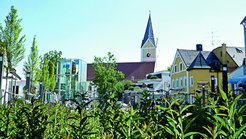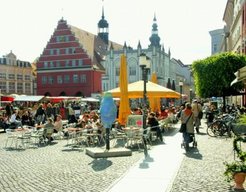
Living
Information on living and studying in Germany – in Bavaria or in Mecklenburg-Western Pommerania
Germany
The Federal Republic of Germany is situated in the heart of Europe. In terms of population being the largest country in the European Union about 81 million people live in Germany, 7.3 million of whom are foreigners.
Germany has an extraordinary variety of charming landscapes and a moderate climate and is one of the most highly industrialised and economically powerful countries in the world, the economic system being classed as a social market economy. The government of Germany pays great attention to the education and research in order to maintain its leading status in the world.
The State of Bavaria
Bavaria is the state at the heart of Europe. Following the fall of the Iron Curtain, Bavaria has once again become the gateway to the neighbouring countries in eastern and south-eastern Europe and an important link between the old and the new countries of the EU. Bavaria is the largest state in the Federal Republic of Germany. More than 12 million people live and work in its more than 70,000 square kilometres.
Bavaria is a country of great diversity. It combines untouched nature and vibrant life. Bavaria's appearance is characterised by the impressive panorama of the Alps with Germany's highest mountain, the 'Zugspitze', and by the romantic rocky scenery of the area known as 'Franconian Switzerland', just as much as by the extensive river landscapes around the Main and the Danube and by the Upper Bavarian lakes, the Chiemsee, Tegernsee, Königssee, Ammersee and Lake Starnberg.
The State Mecklenburg-Western Pommerania
Mecklenburg-Western Pommerania is a northeastern state of the Federal Republic of Germany. 1.6 Million people live in its 23,000 square kilometers. After reunification, Mecklenburg-Western Pomerania had to cope with various economic difficulties, but great progress has been made so far. The newly established infrastructure and the well-educated work force start to attract high-tech companies and research centres. However, Mecklenburg-Western Pommerania will never become an industrialized state and rather provides space for wildlife and untouched nature.
For this reason, tourism contributes more and more to the state's wealth: It has a 300 km long coast with long beaches at the Baltic Sea, a chain of huge lakes (the 'Mecklenburg Lake District') and extended forests. A considerable area of Mecklenburg-Western Pomerania is declared as a national park. Especially the relative closeness to Berlin, the German capital, is a great advantage for the countless summer resorts located at the sea and in the country.
The City of Garching

Garching is a town (16,000 citizens) in Bavaria, Germany near Munich. It is the home of several research institutes and university departments.The town is beautiful located near the River Isar and has a fast connection to Munich via the A9 Autobahn. In addition, the metro line 6 connects Garching with Munich centre (20 min ride). A broad variaty of research and scientific educational institutions are based on the Garching science campus; among them several institutes of the Technical University Munich, four Max-Planck Institutes and the General Electric Research Centre.
The City of Greifswald

Greifswald is a small Hanse League town (55,000 citizens) located at the Baltic Sea. The city has a long history of more than 750 years with the University of Greifswald being over 550 years old. The historical centre is well preserved and almost completely refurbished. Its architecture is typical northern German with numerous huge brick buildings and churches, the witnesses of a glorious past.
Greifswald is located in a beautiful setting close to the world famous islands Rügen and Usedom. It is a university town (Studying in Greifswald) and its more than 10,000 students dominate the life style and living atmosphere. There is full cultural infrastructure with a theatre and opera house, public libraries, galleries, and museums (e.g. Pomeranian State Museum) as well as broad variety of alternative student culture.
The next big city and airport being Berlin, it takes 2.5 hours by train with one train connection per hour or 2 hours on the Autobahn A20.

